The Tia’s Co-Founders Who Reimagined What Millennial Women Want from Healthcare
The next wave of healthcare reform won’t be coming from the federal government. Nor will it emerge from the policy think tanks, the insurance industry, the hospital systems, or medical academia.
In fact, the driving forces already reshaping healthcare aren’t coming from within healthcare at all. The transformative heat and pressure are from the world’s biggest tech and finance companies on one side, and from good old-fashioned grass-roots consumerism on the other.
Simply put, the corporate world is as fed up with the healthcare status quo as are ordinary families. And from both sides, that frustration is leading to the development of new care models that, in some cases, leapfrog over existing systems.
The Young Woman Who Raised $32M to Innovate the Future of Women’s Health
As a woman in her early 20s working and living in New York City, Carolyn Witte experienced first-hand just how broken the health-care system can be when it comes to addressing the health concerns and needs of women.
After going through a three-year long process of seeing various doctors before finally being diagnosed with a hormonal endocrine disorder called polycystic ovary syndrome (PCOS) at 25, Witte knew she had to do something to help other women have a more seamless experience with doctors and health-care providers.
In 2016, she quit her job as a team lead at Google’s Creative Lab to focus full-time on building an innovative health-care platform for women called Tia, which Witte describes as an “ecosystem of products, tools and services designed for the distinct needs of women.”
Tia, officially launched in 2017 and was co-founded by Witte’s college best friend Felicity Yost, who quit her job as a product manager at the internet company Owler to focus on their new startup.
In the beginning, Witte and Yost wanted Tia to be a free information app “that was almost like a personalized WebMD for women’s health” where users could type in concerns and questions about their health and receive a response from a health professional.
But, after reviewing over 200,000 conversations with users within their first few months of business, the now 30-year-old founders quickly realized that not only did women turn to Tia for information and insight about their health, but they also wanted Tia to be their actual doctor.
So in 2019, Tia opened its first physical clinic in New York City, which now includes a team of 15 physicians, physician assistants, registered nurses, therapists, and other health-care providers.
In May 2020, the founders announced they had raised $24.275 million in funding, bringing their total amount of investor money to $32 million — all of which they plan to use to help them expand their services amid the pandemic.
Growing Tia from an App to a Clinic
Using her experience with design from Google and Yost’s experience with technology, Witte says she and Yost wanted to build an app that was “the answer to Googling your health effectively.”
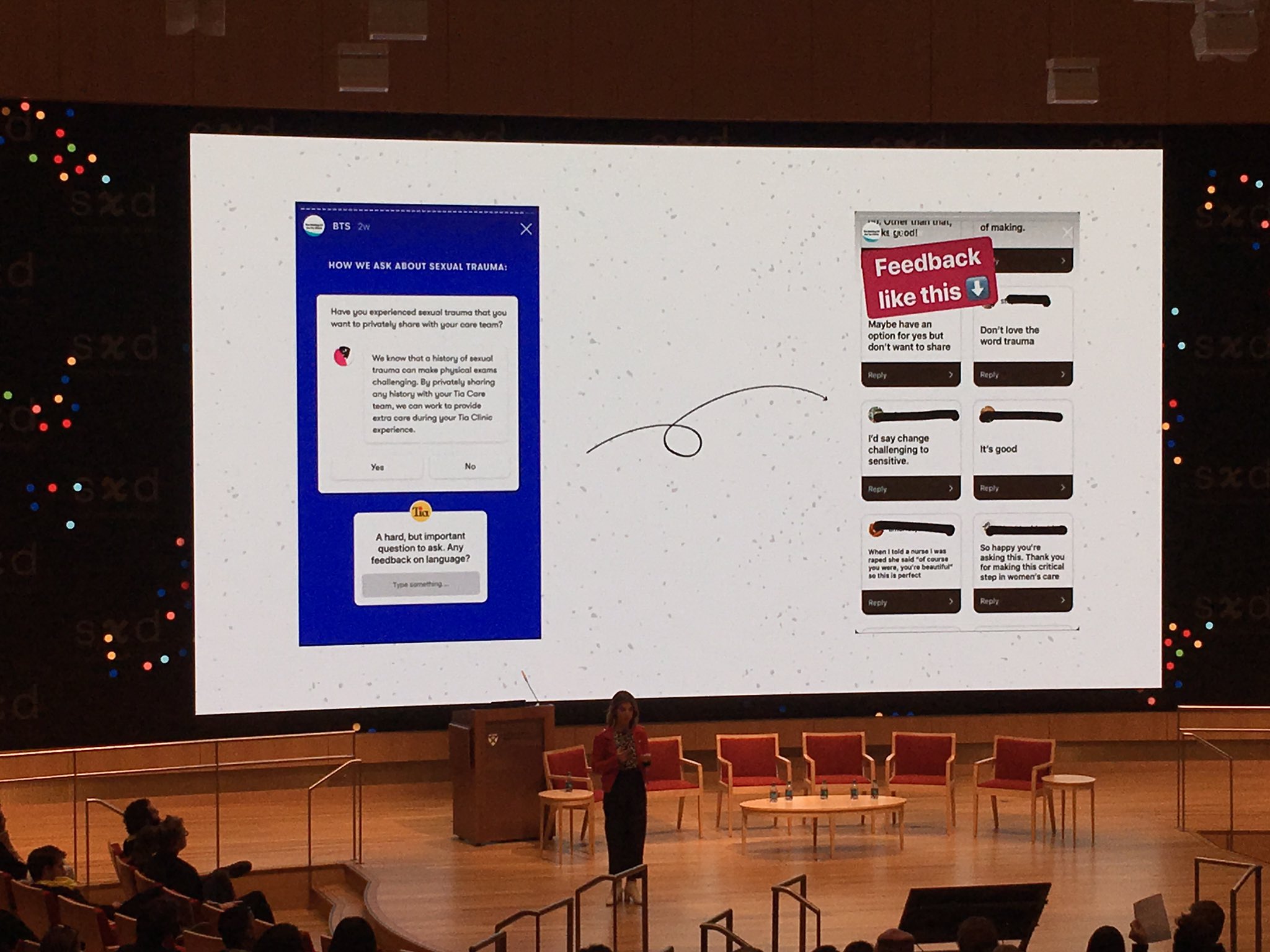
“My approach was that to get women better health care, you first have to give them better health information,” she says, while recalling her own horrible experience of receiving inadequate information and resources about her PCOS diagnosis from doctors. “So, that’s what we built.”
In the beginning, Witte says, she and Yost relied heavily on Instagram marketing, word-of-mouth from users and Google advertising to grow their customer-base. “We wanted to quite literally be the answer to Googling your health so what we did was we bought ads on Google and said, ‘You know, someone’s gonna say ‘Google, I missed my birth control pill,’ and if we buy ads we could intersect and guide them to Tia.’”
These marketing efforts eventually paid off with Tia receiving about 3,000 questions per day from users within their first few months of business. Without any experience or background in the health-care field themselves, Witte and Yost relied on their team of about four health educators who worked in clinics or for Planned Parenthood hotlines to help them provide responses to the health concerns and questions users had. Since these health educators were not actual doctors, Witte says she and Yost had to make it clear in the beginning that Tia was not an app that you could turn to for a diagnosis, but rather an app that you could turn to for information about symptoms and experiences you may be having.
“It was a very fine line because someone might ask a question like, ‘Tia, what causes a UTI?’ And then someone else might ask, ‘Do I have a UTI,’” she says, while explaining that the app would only provide an answer around the causes for a urinary tract infection, but would never confirm with a user that they actually have it. “So that was a fine line that we had to walk, which led us to actually evolve and hire doctors onto Tia who could actually deliver health care in clinic and virtually.”
To date, Tia has one brick-and-mortar location in New York City that serves 3,000 female patients who are looking for a one-stop shop to see a primary care doctor, an OB-GYN, a mental health therapist and other health experts who can service their needs.
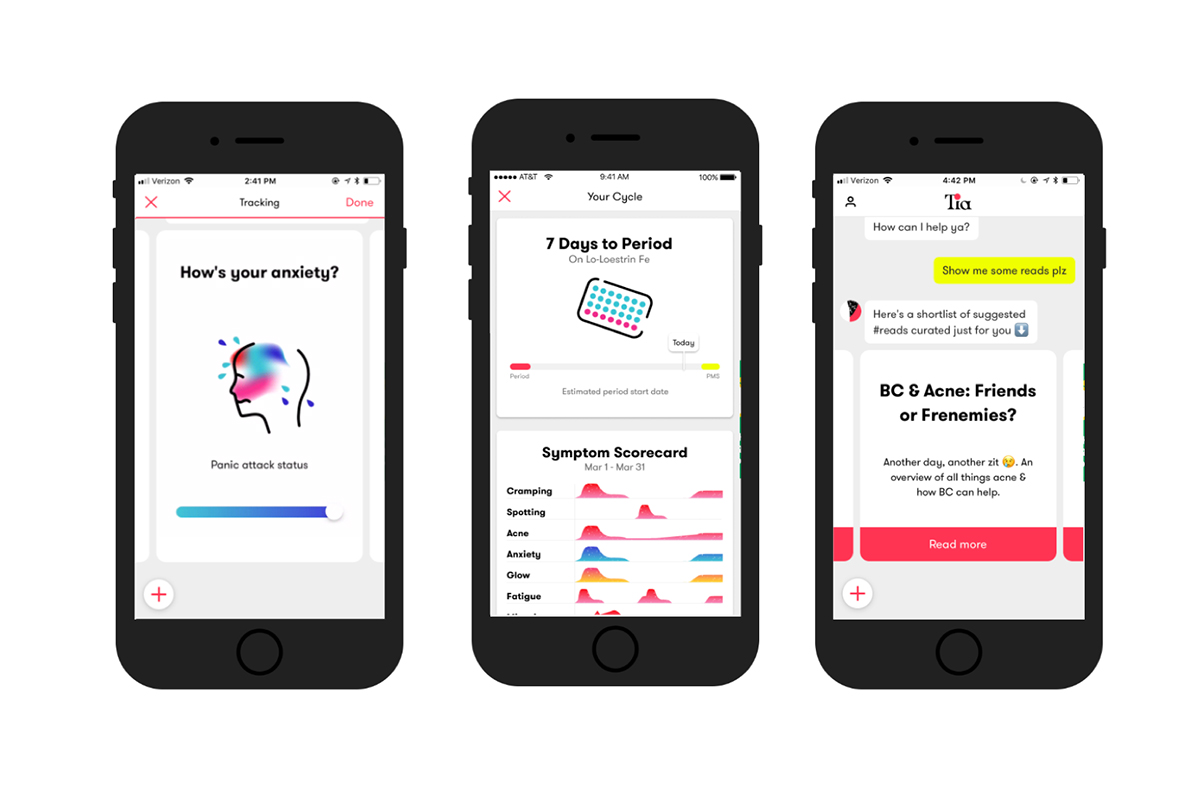
“When we opened the Tia clinic, the premise was to take all these different specialists that don’t typically work together and bring them together, not just under one roof, but to work together in an integrative model to deliver what we describe as ‘whole women’s healthcare,’” Witte says. “So whether you have a UTI, or pelvic pain, or want an IUD, or have repeated migraines, or have PCOS like I do, or struggle with infertility or have a thyroid condition, Tia is your medical home.”
Pivoting for The Pandemic and Raising Money
At the start of the coronavirus pandemic in March, Witte and Yost decided that it was in the best interest of their staff and patients to close their New York City clinic temporarily and ramp up the virtual care services they offered online.
“We did not have to close because we’re not a restaurant or a yoga studio,” says Witte, while adding that Tia re-opened its physical location on June 1. She says their decision to close was made in an effort to protect the safety of their patients and providers since there was a shortage of personal protective equipment for health-care workers.
As a result, Tia started to offer COVID-related care services, gynecology services and primary care services virtually so that patients who were used to visiting their physical location could still receive comprehensive care. These services include a coronavirus risk assessment where you can talk to a doctor virtually about your symptoms if you think you’ve been exposed to the virus, a virtual assessment if you feel like you have the cold or flu, a UTI, a STD, a vaginal infection, and a host of other health concerns.
“The response has been really profound,” Witte says, while adding that 50% of their 3,000 members were using some form of their virtual care services in the first 90 days of them closing their clinic.
As the platform continues to expand in its services and reach, Witte says they have maintained a zero-cost charge for the “tens of thousands” of users who continue to use their app across the country. But, for users who take advantage of Tia’s virtual health-care services, membership comes with a fee of $15 per month or $150 per year. This fee is separate from the co-pays and other service fees you pay, depending on your insurance, when you have an in-person visit with a Tia doctor.
Witte says she and Yost’s ability to successfully scale their startup over the last three years has played a key role in them securing more than $24 million in funding earlier this year.
“We were able to fundraise on not just a vision, but a working model,” says Witte. “Oftentimes people say women have to prove more, well we had a lot of proof that our model was really working. And ultimately, we were looking for investors who believed in the long-term vision for Tia care and who knew that we weren’t just a really cool clinic with, you know, cool looking waiting rooms and a millennial app, but we were really transforming the way healthcare was delivered at scale, and that we were the women to do it.”
Tia’s latest round of funding was led by Threshold Ventures with participation from Define Ventures, ACME, Torch Capital, John Doerr, Homebrew and Compound. Threshold’s managing partner Emily Melton and Define’s founder and managing partner Lynne Chou O’Keefe also joined Tia’s all-female board of directors.
With this new capital, Witte says Tia plans to expand its virtual services and its brick-and-mortar locations, as well as expand the support they offer women throughout their reproductive life, “which means getting into prenatal, postpartum, and obstetrical care to guide women through the pregnancy journey.”
Tia’s latest round was led by new investor Threshold Ventures, with participation from Acme Ventures (also a new backer) and previous investors, including Define Homebrew, Compound and John Doerr,the longtime managing partner at KPCB.
When the company launched, its stated mission was to use women’s data to improve women’s health.
“We believe reproductive-aged women deserve a similar focus, and a new model of care designed end-to-end, just for us,” the company said in a statement.

As Tia continues to stress, women have been “under-researched and underserved by a healthcare system that continues to treat us as ‘small men with different parts’ — all-too-often neglecting the complex interplay of hormones, gene regulation, metabolism and other sex-specific differences that make female health fundamentally distinct from male health. It’s time for that to change.”
But Tia won’t be changing anything on the research front anytime soon. The company is not pursuing any clinical trials or publishing any research around how the ways in which women’s menstrual cycles may affect outcomes or influence other systems, according to Witte. Rather the company is using that information in its treatment of individual patients, she said.
The company did just hire a head of research — an expert in reproductive genomics, which Witte said was to start to understand how the company can build out proof points around how Tia’s care model can improve outcomes.
“By partnering with leading health systems, employers, and provider networks to scale our Connected Care Platform, and open new physical and digital Tia doors, we can make ‘the Tia Way’ the new standard of care for women and providers everywhere,” Tia said in a statement.
FemTech Upgraded: Relationship-Based Healthcare
The term “Femtech” may bring to mind images of an obnoxiously pink barbie laptop covered in flower stickers and love hearts… and if that’s your thing, then why not? However, Femtech goes a little deeper than that, and is revolutionizing the world of female health care.
Standing for female technology, Femtech is any technological service, product, or software that is focused on women’s health. The term was coined by Ida Tin, the founder of the period and fertility tracking app, Clue.
Femtech is not only important in meeting female demand for technology, but also in raising awareness of the inequality in women’s healthcare. Shruthi Parakkal, a consultant at market analysts Frost & Sullivan said to the Guardian that Femtech has “added momentum to healthcare companies across the world, recognizing the need for specialized solutions catering to women’s health.” Let’s face it, women’s bodies are wonderfully nuanced, and their individual needs should not be overlooked.
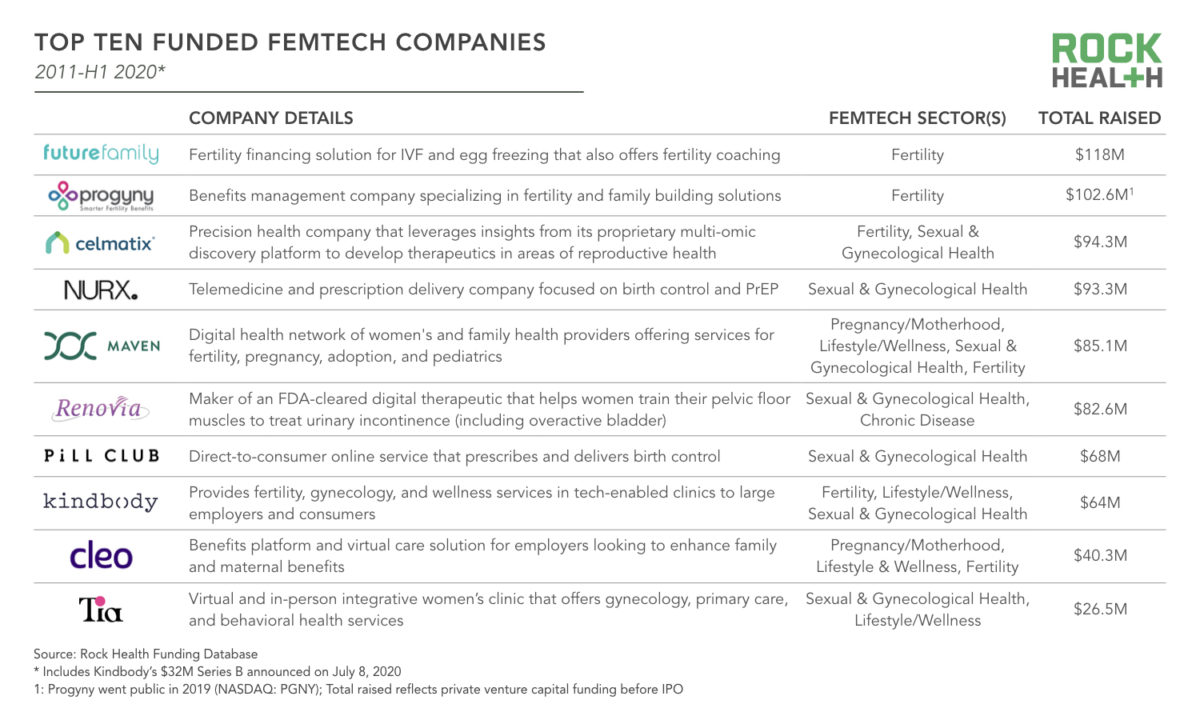
In total, $688.8M has been invested in digital health companies targeting fertility and pregnancy/motherhood through H1 2020. This represents 65% of all Femtech funding, and includes six of the top 10 funded Femtech companies. Comparatively, less than 45% of the US female population is of reproductive age, and only a portion of this subset is actively trying to get pregnant, is pregnant, or is post-pregnancy.
By Women, For Women
Tia began its life as a small app with the tagline, “Your personal, private women’s health advisor,” and is blossoming into one of the fiercest startups in the business. A health app created “by women for women” is still a rarity — even with the rise of Femtech — and Tia’s latest endeavor of opening up IRL clinics is seemingly the first of its kind.
The app allows you to track not only your cycle but a whole host of other physical and mental symptoms, such as fatigue and anxiety. The app is displayed to mimic a text conversation with your health adviser. You may only be messaging an automated bot, but emojis and Beyoncé references are still included, as the app is lovingly engineered towards a relatable female experience.
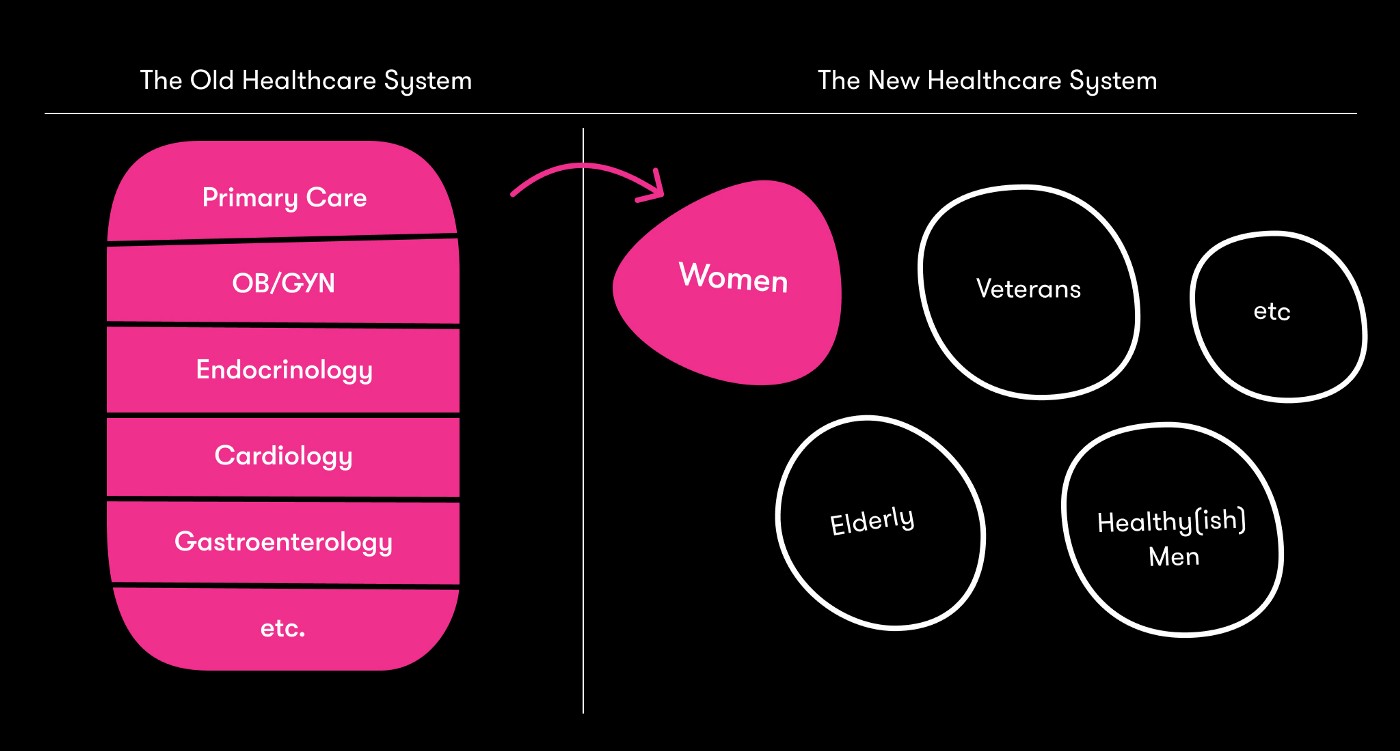
Tia’s philosophy is that it takes one to know one, or in other words, only women should be giving out advice for other people’s vaginas. So many women dread a trip to the gynecologist and let’s face it, the idea of some middle-aged Greg advising you on your vagina while a nurse watches from the corner of the room is awkward to say the least. Tia literally cuts out the middleman by opening the first Tia Clinic in New York in 2019.
The Tia Clinic seems like a medical dream come true for women who want a healthy body, mind, and relationship with their doctor. It will offer a unique blend of modern Western medicine and holistic practice such as naturopathy and meditation classes. Long waiting times will be tackled with same day or week appointments, and outside of the clinic patients will be able to text their doctors.
Tia emphasizes their ethos that anybody is able to access the Tia Clinic. Their website states “we believe every person — not just a few — should have access to personalized, best-in-class healthcare… our doors are open to anyone with a uterus — no matter what you look like, what gender you identify with, or who you love.”
Why People + Tech > Tech Alone
Throughout Tia’s trajectory from digital to physical, and from a pure tech company to a tech-enabled clinical services business, there’s been one unifying thread that’s guided its approach throughout: relationships.
Tia has believed then and now that women want someone, not something to manage their health. That for women, quality healthcare means a real face and a safe space that makes you feel seen, heard, and compassionately cared for — online and offline. And that Tia’s mission and foremost innovation is building a relationship-based care model at a time when “relationships” in healthcare are evermore rare.
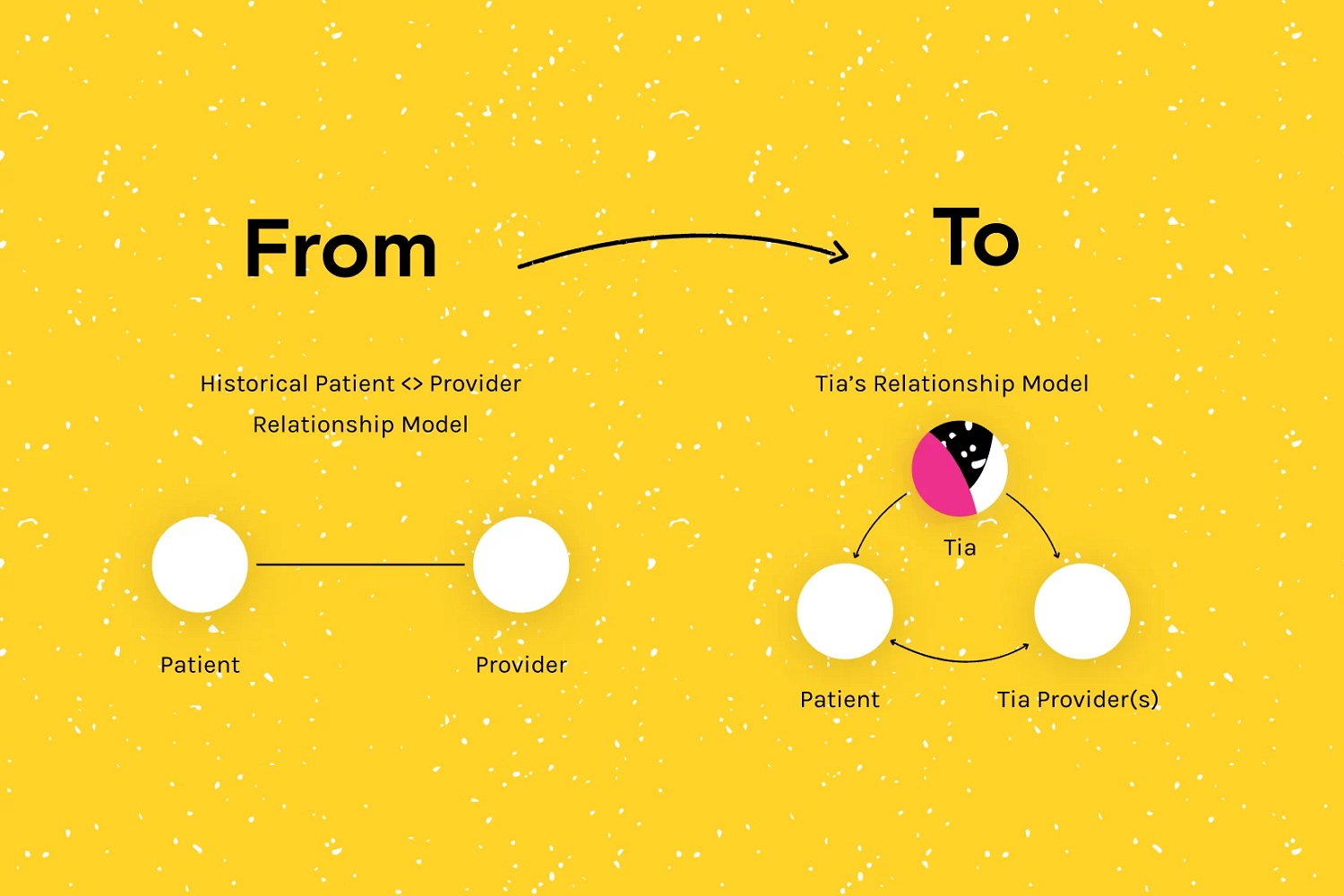
Perhaps the most innovative aspect of the Tia Clinic is a feature that they have coined called “cycle-connected care.” Dr. Stephanie McClellan, the Tia Medical Director, defines cycle-connected care as “the notion that the menstrual cycle — not just women’s periods, but our broader cycle and associated physiological and emotional manifestations — is the 5th vital sign.”
In other words, women’s health — both emotionally and physically — is fundamentally related to their menstrual cycle and this should be considered accordingly when diagnosing and treating a patient. This is where longitudinal cycle data comes in. This slightly daunting term simply means the information that can be taken from health tracking apps, such as the Tia app. If the user regularly updates their symptoms on the app then this builds a picture of their overall health over time.
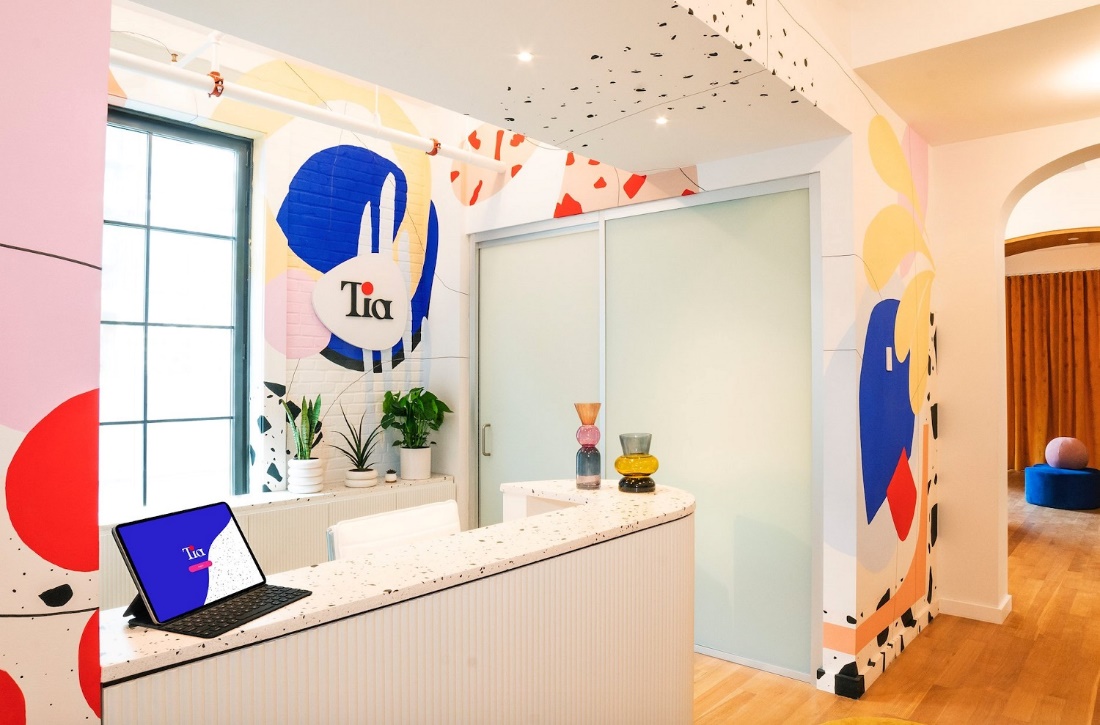
Cycle-connected care is the healthcare provided when doctors are able to view the individual patient’s longitudinal data and connect the dots between their various symptoms. This also minimizes the possibility for human error, which can occur when a patient tries to recall their symptoms from memory.
In order to achieve this, the Tia app and the Tia Clinic are linked. All of the tracking that the patient has done on the Tia app will be accessible to the Tia doctor. This will aid the doctor in creating a fully comprehensive overview of the patient’s health in a way that is unique to the women’s body.
Despite the influx in demand and pressure to rapidly grow to service more members, Tia recently made the call to deliberately slow down before scaling up. It continues to believe that changing women’s healthcare is a marathon, and not a sprint, and that unchecked “hockey stick growth” cannot be applied to clinical care delivery when real human lives are at play.
Instead, Tia is taking the approach that growth must be deliberate, thoughtful, and obsessively monitored to ensure care quality is never — not even for a second — sacrificed because of startup “growing pains.”









